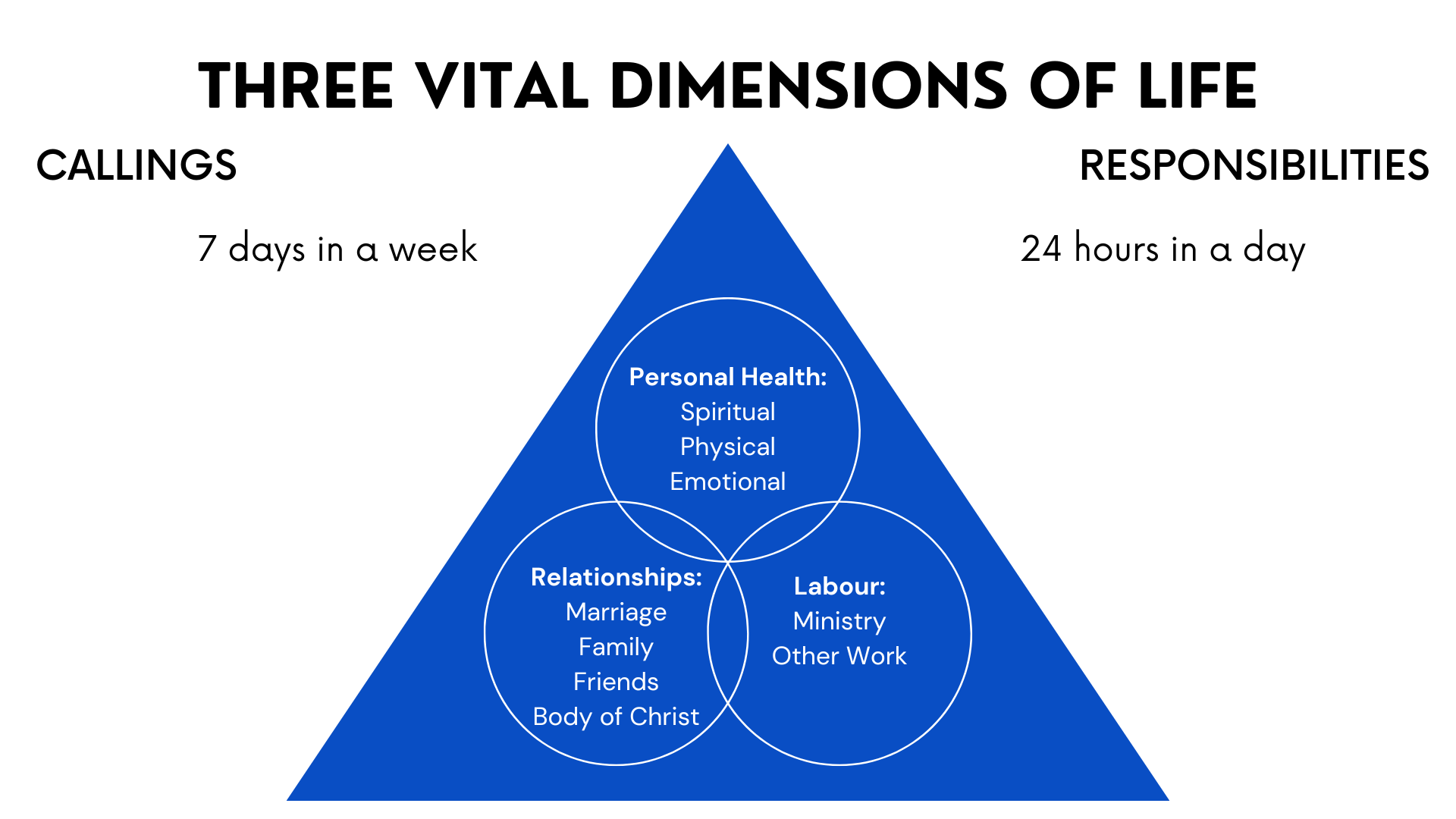When it comes to the number of pastors who are leaving the ministry, the statistics are staggering. Barna Group, a Christian research organisation, reported that factors which lead to burning out or quitting include stress, isolation, political division, impact on family, and concern about the future of the church.
How can we flourish and find rest in the middle of the pressures of ministry? Can we really thrive in life and ministry without burning out? After engaging with many pastors and from my own experience in ministry, these are the lessons I am learning.
Know and Embrace Who You Are
God is God. I am not! He is at the centre of the universe and he has a plan of redemption. The Lord is actively uniting heaven and earth and bringing about shalom. However, sin distorts the difference between Creator and created.
I am often tempted to think that God needs me to accomplish his purposes, that ongoing redemption is dependent upon me. This makes it difficult to say “no” even if my schedule is full. That burden is heavy and no human can carry it without burning out.
I remember the gradual dawning of the awareness that the triune God does not need me; he is complete, content, not lacking anything. The Bible says in Deuteronomy 6:4, “Hear, O Israel! The Lord our God, the Lord is one.”
The Lord calls us to fulfil his assignments during the hours allotted to us.
He is exclusive in self existence, omnipotence, omnipresence, omniscience, holiness, goodness, and justice. This almighty magnificent glorious God does not need me. But he loves me, delights in me, and invites me to be a part of his story of redemption.
It is a position of privilege to receive an invitation to join him and partake of his victory. I cannot believe he wants to include me! This lifts the burden of saving the planet from my weak shoulders, knowing he is sovereign in accomplishing his plan, with or without me.
“Remember this and stand firm. . .for I am God, and there is no other; I am God, and there is none like me, declaring the end from the beginning and from ancient times things not yet done, saying, ‘My counsel shall stand, and I will accomplish all my purpose.’” (Isa. 46:8a, 9b,10)
Know and Embrace Your Assignment
The conquering King gives each one of his children a specific assignment in his redemptive plan. My responsibility is to focus on what he has assigned to me, specifically. I am not responsible to focus on the assignments of others, not to compare or judge assignments.
In the Bible Reading Plan that I use, Rebecca Van Noord addresses this. The apostle Paul had been given a specific assignment to minister to the Gentiles (Acts 9:15), and when some in his community questioned his authority, because of his poor verbal abilities, he said: “But we will not boast beyond limits, but according to the measure of the assignment that God has given to us” (2 Cor. 10:13).
He knew his assignment and would not be deterred. Van Noord concludes, “We’ll always come up short if we judge by comparison; there will be someone who is smarter or more gifted than we are. But by thanking God for our gifts (and for others’ gifts), and asking him for guidance in developing them, we can use them appropriately—not for our own gain, but to further his kingdom.”
During the Covid pandemic, church services were live-streamed around the world, and church members could visit different churches each Sunday. It was reported that some pastors felt pressured to compete and compare themselves with other pastors. This can lead to pride or feelings of inferiority, jealousy, envy, and greed.
Focusing on one’s specific assignment and fulfilling one’s calling is all that the King desires. In his plan, he entrusts and equips each person with specific things to do—this is his doing. No wonder the apostle Paul said, “The one who boasts, let him boast in the Lord” ( 2 Cor. 10:17). He gives, he equips, he assigns, he accomplishes his plan. We are his privileged ambassadors.
Know and Embrace Your Time Limits
The Lord calls us to fulfil his assignments during the hours allotted to us. In his book Lead, Paul Tripp describes and illustrates three vital dimensions of our daily lives.

He says, “….as one of these areas of your life grows, it can’t grow outward, because there is no outward. God chose to give you only twenty-four hours in a day and seven days in a week, and you will never get anything more. So if one of these three circles grows, it will of necessity cause another circle to shrink. . . .
When you unwittingly deny God-given limits of time, you assign more ministry work than a leader can do without shrinking the amount of time he can invest in other and unavoidable areas of calling and responsibility. . . .
So more ministry means the leader spends less than the needed time investing in his marriage, parenting his children, fellowshipping with his church family, and serving his neighbours. . .the Lord of the church would never call us to one area that would necessitate our neglecting or disobeying another such area.”
Pete Scazzero affirms the same by saying, “We find God’s will for our lives in our limitations.”
We can live within our God-ordained limits because we have a God who is limitless in power, creativity, and resources. He is able to do what we cannot. If I overextend myself in ministry, I can easily neglect my personal times with Jesus, gazing at his face, worshipping and remembering who it is I am serving, and what life is about.
Busyness in ministry will be all-consuming and I can lose the joy of my salvation, lose intimacy with my family and friends, and be driven by the needs of the moment, not by my King’s agenda. All this can lead to an unbalanced lifestyle, loneliness, and burnout.
Enjoying Life Within Our Limitations
Near the end of his life, English Anglican cleric and theologian John Stott was asked how he kept his vigour and joy throughout the many years of ministry. He said he set aside specific times of Bible Study, meditation, and prayer: an hour a day, a morning a week, a day a month, and a week a year.
What we do not have time for, we can entrust to the Creator.
This, I believe, is the secret to maintaining a steadfast heart in ministry. In spending time with God, we discover, as did Jonathan Edwards, that God does not drive us by duty, but draws us by beauty, not by fear but by irresistible attraction.
This will be reflected in our lives and set the tone for our teaching and keep us from getting side-tracked with all the political, personal, and theological divisions that are plaguing many churches. God’s kingdom is totally different than any earthly kingdom. Let us magnify and exalt him in our lives and ministry.
All of life is worship. Even being a good steward of the physical body God has gifted us, to fulfil the responsibilities he has assigned to us, is worship. So exercise, getting fresh air, eating healthy, and sleeping is worship.
Seeing exercise as worship has been the biggest motivator for me. I often find myself singing, “O Worship the King,” as I get down on my exercise mat or take time for a walk during the day. Our physical health can affect our emotional and spiritual life.
Enjoying Jesus, which motivates and empowers us to live faithfully in all our different assignments, is where we find balance and rest. What we do not have time for, we can entrust to the Creator. He is the Lord of limitless possibilities and energy and he never burns out.
The Lord invites us, “Come to me, all who labor and are heavy laden, and I will give you rest. Take my yoke upon you, and learn from me, for I am gentle and lowly in heart, and you will find rest for your souls” (Matt. 11:28-29).
Questions for Reflection
- Is there evidence of imbalance in my life?
- How is the health of my marriage?
- What is the health of my relationship with my children?
- How is the health of my devotional life?
- Am I taking care of my health, my physical well-being?
- Is there tension at home: marriage, children, financial debts?
- How can I learn to embrace and enjoy my limitations?
- How can I trust the God of limitless power and energy?









